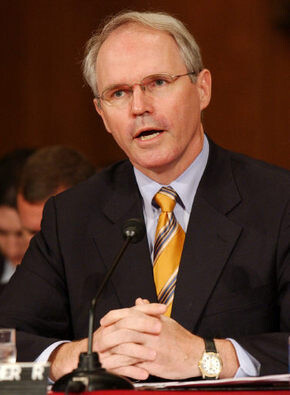hankyoreh
Links to other country sites 다른 나라 사이트 링크
Top negotiators meet to overcome nuclear deadlock

Washington and Pyongyang are scheduled to meet on March 13 in Geneva to try to make progress on the North Korean nuclear issue, which has stalled in recent months due to disagreements over North Korea’s uranium enrichment program, or UEP, and delivery of energy aid.
The United States reportedly hopes to break the deadlock with a new plan to allow both nations express their respective positions. The plan involves the creation of two documents made via confidential minutes that will be taken at the meeting, which is scheduled to last for two days. One of these documents is to be an official agreement made by the United States and North Korea, the other will be a more detailed, but confidential, document kept between the two nations.
North Korea has not admitted to having pursued a uranium enrichment program, and the resolution is aimed at clarifying North Korea’s position, while satisfying the U.S. demand for a full declaration from the North.
The official document will contain North Korea’s declaration on its plutonium-related activities, as well as the positions of both North Korea and the United States regarding Pyongyang’s alleged UEP and nuclear cooperation with Syria, according to diplomatic sources who are familiar with the six-party talks.
It will only be in the confidential document that North Korea reveals in detail what has really been going on with its alleged UEP and nuclear transactions with Syria, and the details will be confirmed as North Korea’s declaration is verified.
Under an agreement reached through a six-nation forum on the North Korean nuclear issue, Pyongyang shut down its nuclear reactor and agreed to provide a full declaration of its nuclear programs by the end of last year. In return, the remaining nations, the United States, China, Japan, Russia and South Korea, agreed to provide the North with energy aid and other diplomatic concessions. The talks stalled, however, when the declaration provided by the North last November was deemed unacceptable by the United States and it claimed that the North had not gone far enough in detailing the extent of a suspected uranium enrichment program and its involvement in nuclear proliferation, after it was linked to nuclear activity in Syria. The North, meanwhile, claimed that the nations involved in the six-party talks had not met their obligations in terms of energy aid and that the declaration it had submitted was complete.
While North Korea is reportedly satisfied that the positions of both North Korea and the United States on Pyongyang’s alleged UEP and nuclear proliferation activity will both be described in the official document, as the United States has proposed, it is allegedly reluctant to admit to having pursued either of these things in the confidential document.
Kim Kye-gwan, North Korea’s top nuclear negotiator, and his U.S. counterpart, Christopher Hill, are slated to discuss the issue for two days.
Please direct questions or comments to [englishhani@hani.co.kr]
Editorial・opinion
![[Column] Has Korea, too, crossed the Rubicon on China? [Column] Has Korea, too, crossed the Rubicon on China?](https://flexible.img.hani.co.kr/flexible/normal/500/300/imgdb/original/2024/0419/9317135153409185.jpg) [Column] Has Korea, too, crossed the Rubicon on China?
[Column] Has Korea, too, crossed the Rubicon on China?![[Correspondent’s column] In Japan’s alliance with US, echoes of its past alliances with UK [Correspondent’s column] In Japan’s alliance with US, echoes of its past alliances with UK](https://flexible.img.hani.co.kr/flexible/normal/500/300/imgdb/original/2024/0419/2317135166563519.jpg) [Correspondent’s column] In Japan’s alliance with US, echoes of its past alliances with UK
[Correspondent’s column] In Japan’s alliance with US, echoes of its past alliances with UK- [Editorial] Does Yoon think the Korean public is wrong?
- [Editorial] As it bolsters its alliance with US, Japan must be accountable for past
- [Guest essay] Amending the Constitution is Yoon’s key to leaving office in public’s good graces
- [Editorial] 10 years on, lessons of Sewol tragedy must never be forgotten
- [Column] A death blow to Korea’s prosecutor politics
- [Correspondent’s column] The US and the end of Japanese pacifism
- [Guest essay] How Korea turned its trainee doctors into monsters
- [Guest essay] As someone who helped forge Seoul-Moscow ties, their status today troubles me
Most viewed articles
- 1[Column] The clock is ticking for Korea’s first lady
- 2Hong Se-hwa, voice for tolerance whose memoir of exile touched a chord, dies at 76
- 3[Column] Has Korea, too, crossed the Rubicon on China?
- 4After 2 months of delayed, denied medical care, Koreans worry worst may be yet to come
- 5[Correspondent’s column] In Japan’s alliance with US, echoes of its past alliances with UK
- 6All eyes on Xiaomi after it pulls off EV that Apple couldn’t
- 7[Photo] Smile ambassador, you’re on camera
- 8US overtakes China as Korea’s top export market, prompting trade sanction jitters
- 9S. Korea “monitoring developments” after report of secret Chinese police station in Seoul
- 1075% of younger S. Koreans want to leave country